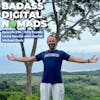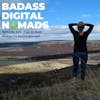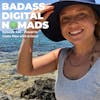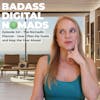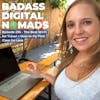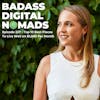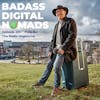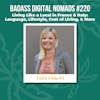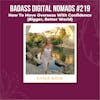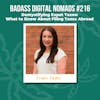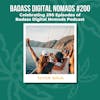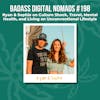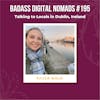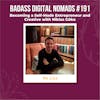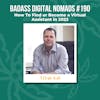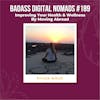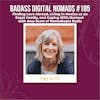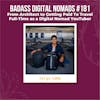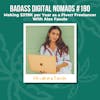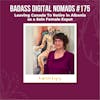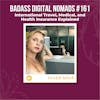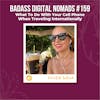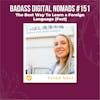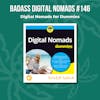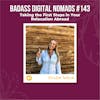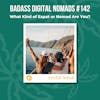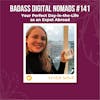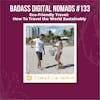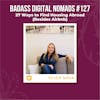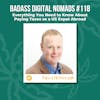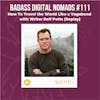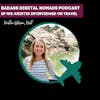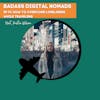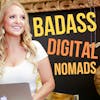Slow Travel Tips from Nora Dunn, The Professional Hobo
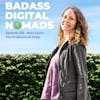
Nora Dunn, The Professional Hobo, opens up about solo travel, how she makes money online, how she meets local people, and why she sold her financial consulting firm to travel the world.
Nora Dunn, The Professional Hobo, opens up about the pros and cons of solo travel, how she makes money online, and why she sold her financial consulting firm to travel the world. She also shares why she set up a home base in Toronto, Canada, why she doesn't rent it out when she's away, and why she's experimenting with group travel and co-living after 17 solo years on the road.
Nora specializes in helping adventurous people design their lifestyles and arrange their affairs to travel long-term. With 75-some-odd countries under her belt, Nora offers her favorite tips for travel-friendly packing, meeting local people, infusing your creativity into business, and much more.
Plus, learn how long-term travel compares to short-term travel and why Nora prefers to indulge in slow travel!
Special Offers:
- Pack Light with Unbound Merino wool
- Download Nora’s Checklist of 10 Things to Do Before You Travel Long-Term
- Leave a comment on this video for a chance to win a $350 gift card to Tortuga Backpacks Gear!
- Get $75 off Anatomie Clothing
- Celebrate the 1-year anniversary of Digital Nomads For Dummies
Topics Discussed:
- Staying at a co-living space in Madeira, Portugal
- Solo travel vs. Group travel / Co-living
- Long-term travel (slow travel) vs. Short-term travel
- How to make friends with the locals
- Nora’s favorite travel tips after being to 75 countries
- The benefits of having a home base
- Must-have items to make your travels more comfortable and luxurious
- Packing tips for flying carry-on only
- Income stream ideas for digital nomads
- Making money through YouTube and content creation
- Integrating your creativity into business
Questions Answered:
- Why live in Madeira, Portugal as a digital nomad?
- What’s the difference between living in a place for 1 month vs. 1 year?
- Is slow travel better for digital nomads?
- How do you quickly adapt to living in a new city/country?
- When did “digital nomad” become a word?
- Why set up a home base as a full-time traveler?
- Why don’t you rent out your house when you’re traveling?
- What clothing/fabric is best for travel?
- What types of businesses and income streams have you had as a digital nomad?
- What is your primary stream of income as a content creator?
- Why did you start a YouTube channel?
- What inspired you to try co-living?
Episode Resources:
Related Videos:
- How Kristin Packs for Travel
- What To Wear for Travel
- Day in the Life in Madeira
- Pack MORE In Smaller Bags 🧳 Tips for Flying Carry-On Only ✈️ 🎒
- Avoid These TSA Line MISTAKES at All Costs! (11 Airport Security Tips)
- 15 Remote Jobs That Pay $100K+ per Year
- Full-Time MINIMALIST TRAVEL | Tips for Simplifying Your Life on the Road
- The Ugly Truth of Full Time Travel: What You Need To Know
- Estonia Playlist
Related Podcasts:
- How To Travel the World Full-Time with Remote Year Founder, Greg Caplan
- What It's Like to Work Online and Travel with Remote Year
Co-Live & Co-Work With Other Digital Nomads:
Connect with Nora:
- Visit her website
- Subscribe to her YouTube channel
- Follow her on Instagram
Connect with Kristin and Support the Show:
Find more episodes at www.badassdigitalnomads.com
Introduction: Welcome to Badass Digital Nomads, where we're pushing the boundaries of remote work and travel, all while staying grounded with a little bit of old school philosophy, self-development, and business advice from our guests.
Kristin Wilson, Host: 00:00:22 Hey there, Kristin, from Traveling with Kristin here and welcome to episode 223 of Badass Digital Nomads. My guest today is an OG digital nomad and former financial planner, Nora Dunn, who's also known as being the professional hobo. And she helps people design their lifestyles and arrange their affairs to travel long term. Nora has been traveling full-time since 2006. She's been to somewhere around 75 countries, and today you might know her from her blog. She had one of the very first travel blogs, The Professional Hobo, and she also has a YouTube channel where she helps people travel in style and has lots of other travel tips there. In today's conversation, we're talking about how she got started in this lifestyle, how she's been able to make money over the years, and the different ways that she did that, the different ideas and how those revenue streams have evolved and grown, and also what she's learned and why she's decided to stop solo traveling right now and do group travel and co-living.
Kristin: 00:01:39 So we're going to get into all of that as well as some insights into how she's grown her YouTube channel and tips on making money with content creation. One of the companies that Nora and I both rely on for our travel needs is Unbound Merino which makes very comfortable, lightweight and wrinkle-free clothing for travel that you can wear up to 14 times before having to wash it because it is an naturally antibacterial and antimicrobial being Merino wool. And so if you want to check out their clothing and their products, this is the type of clothing that Nora travels with to be able to travel carry on only. And if you've seen my packing video and my how not to look like a tourist video, you know that I wear it a lot as well. Like half of my suitcase is Merino wool clothing these days. So I will link to my referral link in the show notes, and you can also check out their bundles where you can save a lot of money up to like $95 if you bundle some shirts or boxers or socks and different items together. It was such a pleasure to have Nora on the show after her 17 years of experience traveling around the world. So I hope you find a lot of value in our chat today.
Podcast Interview:
Kristin: 00:03:07 I am so excited to welcome the lovely Nora Dunn to the show today. Welcome, Nora. I have to say, so many people have asked for you to be here and they didn't even know that we were internet friends. So it's been a long time in the works and I'm so pleased that you are with us today. So where are you joining us from?
Nora Dunn: 00:03:29 Well, thank you so much, Kristin. It is such a pleasure to actually finally meet you in person. If we can say that's meeting in person in that sense. We have been internet friends forever, uh, and I am hailing from Madeira right now where you were recently, earlier this year, if I'm not mistaken.
Kristin: 00:03:45 Yes, I know. And I feel like I was just there, but it was almost 10 months ago. And then I remember when I was leaving, you messaged me asking for Madeira tips and now you're there and you're leaving for another place, which we'll talk about in a minute. But how has your experience been there in Madeira?
Nora: 00:04:05 So this is my second go around this year. I spent the month of January here. I was staying at a co-living space, which is kind of a unique experiment that I'm working on this year. And it was fantastic. I just fell in love with the island. It was amazing. And I knew I wanted to come back and I wanted to feel it in the summertime. 'cause January was the height of winter, uh, or the depths of winter, as you might say. So I wanted to see what it was like in the summertime. So here I am. It is August, late August, and it's really hot. It's not normally hot. Madeira is one of these islands that's supposed to be like perfectly temporal,
Kristin: 00:04:35 Eternal spring.
Nora: 00:04:37 Right. But because of course this heatwave that has just gripped so much of the world right now, I'm really feeling it 'cause no, no place really have air conditioning. And my place happens to trap the heat. So if you hear a little breeze every once in a while, it's, it's me with my little hand fan. I went out and bought a hand fan and it is my savior <laugh> in the steamieness of Madeira, summertime.
Kristin: 00:05:00 And where in Madeira are you staying? And did you, are you staying same place that you were in January?
Nora: 00:05:06 No, I'm in a different place this time. Uh, I got a studio apartment of my own this time, which actually has very interestingly changed my experience of Madeira versus staying in a co-living space, uh, in ways that I'm just kind of starting to really pontificate on. But in both cases, I'm staying in the town of Funchal, which is the capital of Madeira.
Kristin: 00:05:26 Oh, okay. Yeah. So it could be hot there 'cause you don't get as much of a breeze from the, the ocean. Uh, so what was it about Madeira that led you to return in the same year?
Nora: 00:05:40 So the island is absolutely gorgeous, and you have the best of all worlds. You've got the beautiful ocean and the, the terrain basically just goes up vertically from there. So I mean, the, the town of Funchal in particular is just, uh, all of these beautiful terracotta roofed houses that are just perched on the, the steep incline that just goes up from the ocean. Uh, but then you've got, it's a small island, but there's over 2000 miles of hikes and unbelievably beautiful nature and high mountains and enchanted forests and beautiful waterfalls. So there's a great ability to enjoy nature. And then there is this thriving digital nomad community that of course, you know all about as well. And, uh, that really makes it easy to arrive, to get plugged into social events of all kinds. I mean, there's, there's stuff going on every single day of the week, like the FOMO is real. Like as soon as I arrive I have social fatigue. Um, but it's just so nice to be able to pick and choose all of these events and to really make lots of friends and contacts very easily when you get up to the island.
Kristin: 00:06:45 Well, let's go back a little bit because you've been traveling for a very long time. You were one of the OG digital nomads from Toronto, right?
Nora: 00:06:56 Yes.
Kristin: 00:06:57 And so how many years have you been traveling? How many countries have you been to? And was that mostly by yourself in a solo travel style?
Nora: 00:07:08 So I sold everything that I owned in late 2006, and I took off in January of 2007. So I've been a digital nomad ever since then, which I think puts me at 17 years <laugh> in that period of time. I have lived and traveled around the world in various places. I've probably hit up about 75 countries, honestly, I'm not counting and I keep losing count. Um,
Kristin: 00:07:27 Me too,
Nora: 00:07:28 Right? for me--
Kristin: 00:07:29 I just recounted I've been saying 60, I'm like, oh, it's actually 63. But who's counting at that point?
Nora: 00:07:34 <laugh>. Exactly. And I think you and I are very similar. 'cause I think our mos are really just to experience life around the world, to live around the world rather than to, you know, we don't have proverbial bed posts that we're, we're checking off. Uh, we don't have notches on the, on the bedpost as it were. So for me, it's, uh, you know, if I like a place as I did with Madeira earlier this year, I go back, uh, and in some cases I traveled so slowly over the years that it was imperceptible. Uh, like you, I stayed in places for up to years at a time and really dug into what it was like to be in that place and to experience daily life and to really develop community, local community, uh, in these locations. And so, I mean, I had a year and a half in Australia, about nine months in New Zealand, two years in Peru in the Sacred Valley, nine months in Ecuador, six months in Hawaii. So lots of places where I've spent six months or longer in a location and really had a chance to, to go deep.
Kristin: 00:08:30 And how do you find these differences in staying in a place for six months, one year, two years, versus going to a place for one month or so like many people do, and the quote unquote slow travel lifestyle? This is something that I talked with Palle Bo about because he travels at such a, a fast rate, and I know that you guys were just in Bulgaria together, and you talked about that as well. So this seems to be a topic that's, that's coming up a lot. And I think a lot of people want to see the world and wanna see as much as they can, but they also don't wanna compromise the ability to really immerse themselves in each culture and get to know the place and get to know the community. So what are your thoughts there on the, the pros and cons of, of these lifestyles and, and ultimately what you decide to do and how you decide to mix it up?
Nora: 00:09:24 I think really it all boils down to your travel lifestyle and whether or not you're working remotely. So if you are a digital nomad and you have a full-time job and you're working remotely, I think that the biggest misconception about travel is that, that word travel is synonymous with vacation. And because when people think really prior to the last couple of years when digital nomadism and became on vogue, really, when people think of travel, they think of vacation and a vacation mindset of the cadence, the budget, the activities, everything about a vacation is different from travel as a lifestyle. So if you are working remotely and you're working full-time, I, it just, it takes on a, a totally different life. And, and so this is why I really particularly enjoy slow travel is because if I actually want to get to know a destination, but I'm also working full-time and I care about things like self-care and the ultimate maintenance and sustainability of this as a lifestyle as such I've been doing for 17 years is really important to, to slow down.
Nora: 00:10:27 Uh, and the example I like to use is when you're on vacation, of course you're not working. So you're out every single day, you're doing touristy things and you're out and you're, so, you're spending a lot more money. You're staying in hotels, you're eating your meals out again, spending a lot more money. So your budget is, uh, is one consideration, but then also the amount of time you're spending doing things is different. So then I, I like to say, when you are at home, whatever that looks like working full time, how often do you go out and do what the equivalent of a touristy activity would be? I mean, if you're lucky, it might be, might be a couple of times a week, maybe on the weekends you're out doing something, or one evening a week the rest of the time. You're just tending to the daily tasks of life shopping, cooking, laundry, Netflix, and chill <laugh>, because we don't need that regardless of whether or not we're traveling full time. So if you wanna actually connect with the destination and the people at that place, you now inherently have to spend exponentially longer there in order to do that. So, I mean, for me personally, it is, it is the minimum of a month, but even a month is a very short period of time. And of course, the other thing that's, that people dramatically underestimate, my, myself included, is the amount of time and energy it takes to just learn how to survive and exist in a place.
Kristin: 00:11:42 Yeah.
Nora: 00:11:43 I, I looked at the, like I was in Bulgaria last month with, with palbo, and I mean, the going to the supermarket was an adventure. The amount of time it took me to figure out what the yogurt was and what kind I needed to buy <laugh> was like, I mean, I was like, 15 minutes, I'm staring at this wall of yogurt and I don't know what anything is, and I don't know how to read anything. I still not convinced that I didn't go home with sour cream that day.
Kristin: 00:12:05 <laugh>, I like to go in places like Bulgaria or Japan where the language is much different. I'm walking around with my Google Translate image feature on trying to figure out what that is. And if you do go to Bulgaria, everyone, then you have to try the yogurt because they do something different. They make it differently. And I, I can't remember what it is that they do differently, but it does taste, it does taste distinct.
Nora: 00:12:31 It it, well, it does. And here's a pro tip that I only discovered this last time I went to Bulgaria. Often I noticed in the restaurants they would have this thing called strained yogurt for dessert. And I was like, yogurt for dessert. I have yogurt for breakfast with my fruit. I don't need this for dessert. But what they do is this strained yogurt is, is they get every extra little bit of moisture out of the yogurt. So it almost looks and has the consistency of ice cream or like gelato super smooth, but it like, is super solid. And then they drizzle it with like homemade honey or, you know, jams or berries, nuts. Yeah. And it's amazing. It's, I've surprisingly good.
Kristin: 00:13:07 Oh yeah. You just reminded me when I was there, I went on a little road trip around the Rose Valley. Well, they were having the, the rose festival at that time. And I had one of those strained yogurts with like rose water and berry jellies or jams, and it was so good. Yeah. It did taste, it was very dessert, like.
Nora: 00:13:29 Yes, exactly. So those are, those are some of the fun things that we only discover if we get to be there for a while.
Kristin: 00:13:36 Right. And, and what are some of the ways that you adapt when you first get to a place? So do you have any sort of tips or maybe routines or habits that helps you really get ingrained in a new place quickly and find your feet?
Nora: 00:13:52 There's definitely a few things that I do. First off, I will tend to, as my pre-arrival research, I will look and see if there are any groups that exist already that are part of like, special interest groups or digital nomad groups. So I'll look on Facebook or, you know, are there digital nomad groups for that location? And it's as simple as getting on Facebook and searching for your destination plus digital nomad and see what comes up. But then also too, I'm a huge fan of meeting more than just digital nomads when I travel because I, I mean, over the years really isn't until recently that there were communities of digital nomads. So for us it was always about meeting local people. Right. And so the, one of the ways that I do that is I, I look for common interests. So there's a few different, uh, things.
Nora: 00:14:36 I, I mean, I'm a Latin dancer. I dance salsa, bachata, a little bit of west coast swing, so I'm always looking for Latin dance socials and they're everywhere. So that's a way for me to show up at an event and connect with people through our common love of dance, which can help us overcome the obstacles of culture and language. Same thing goes for things like rotary. I've been a Rotarian forever and ever. So I can show up to a rotary meeting anywhere around the world and share that common bond and meet a bunch of people that I would never otherwise meet. So that's one way that I socially get my legs under me. Another thing that I do logistically is <laugh> Google Maps is my friend. I mean, every time I get on Google Maps, I can see all kinds of things, but also too often before I go to a location, I may be speaking to someone who's been there before and they may say, oh, check out this place, or go there, or You must go to this restaurant, whatever it is. And whatever they tell me, I find it on Google Maps and then I save it to a list. And I save the information like Theo told me to go there and order the steak <laugh>, whatever it is. So then that way when I arrive to that destination and open up the maps, suddenly I can see all of these places that I've saved around me that are places that people have recommended or that I should go to. And then I automatically, I already have a bit of a, an infrastructure set for me.
Kristin: 00:15:52 That's a really good tip. I've started using those lists a lot and really leaning into that. They're a little unorganized right now, but you've inspired me to clean those up. Maybe I can share them with other people too. And, um, I also use a file and you could do it in Evernote or Apple Notes just to create a folder for each country or each city. And as you collect tips and information, just create a new note in that folder. So everybody who's ever given me a travel recommendation on YouTube, I screenshot this YouTube comments and I put them in that folder. And then when I go there, I'm like, oh, Paris. And I've got places I saved from Instagram and comments and all sorts of things. 'cause you know,
Nora: 00:16:38 oh my gosh, that's brilliant. I love it.
Kristin: 00:16:39 'cause sometimes you go there and you're, you are using Google Maps, but you're looking for a place to eat or something. And it can be hit and miss with that. So I have finally started collecting everything in the same place because I used to just screenshot it on my phone. I have 10,000 screenshots, <laugh>, but now they're filed that way. And it can give you some good starting points and some good ideas. So thank you for that. But did you ever think, when you were starting out in 2006, did you go into this with the idea that you would be living this lifestyle for 17 years? Or what was your vision and your goal for yourself when you first started?
Nora: 00:17:22 I had no idea where I would go, what I would do, how I would make money, or whether it was just something I had to get out of my system for six months. Like, I, I really, all I knew is that I wanted to have nothing holding me back from whatever lay ahead. So that was part of the reason. I mean, when I sold my financial planning practice in Toronto, when I walked into my regional director's office to tell him that I was selling the practice, he knew it. He's like, I knew it some, something was up. I knew that you were gonna do something weird. He said, I'll tell you what Nora, I got it all worked out for you. I'll get someone to run your practice while you're gone and then you can go like, build mud huts or do whatever it is that you wanna do for six months and then you can come back and everything will be waiting for you.
Nora: 00:18:05 And I mean, that was a really tempting offer, but I thought, as long as I know that that is, is waiting for me, it will hinder or inhibit the potential things I could do depending on what I found on the road. So I wanted that unbridled freedom to do whatever for however long that would happen. Did I think I would last 17 years? No <laugh> uh, not at all. But I, I, I just didn't know. And I mean, even in the last 17 years, my lifestyle has changed a gazillion times. And I truly believe that there are as many ways to live the digital nomad lifestyle as there are people doing it. Yeah. And as we get into, I mean the, the sheer definition of digital nomad has changed and broadened extraordinarily since its inception. You know, the, the pure definition of digital nomad when it became a word, which was, I don't even know when, when did, when did digital nomad become a word?
Kristin: 00:19:02 1997.
Nora: 00:19:04 No way. Yeah. That's in your book, isn't it?
Kristin: 00:19:07 It's in my book, <laugh>. But I agree, I always say the same thing. That there's as many ways to live this type of location, independent lifestyle as there are people in the world and you can make it your own. And that's why, you know, there's people that split hairs online like you're a digital nomad if you do this and not if you do that. But people like you and I, we've had home bases. You do currently have a home base in Toronto. There's any kind of definition that you wanna make it. I think it's just having that freedom and having the ability to live wherever you want. Whether you are relocating from the US to Portugal, or you are a roving retiree, or you're a slow traveler, or you're a part-time traveler. It's like there's so many different kind of labels in between. And so I think what's important is that each person just embraces whatever their vision of the lifestyle that they want is, and then goes for that. Because it really doesn't matter what anyone else is doing or what they think.
Nora: 00:20:09 No, exactly. That is, I mean, for after 12 years of full-time travel without an official home base, I burnt out of the travel lifestyle. And that was when I went back to Toronto and got a place for a variety of different reasons I shouldn't board you with, but I thought at that time, that was late 2018. And I thought, well, that's it. I'm not a digital nomad anymore. You know, like I gotta, I gotta hang up the moniker 'cause you know, I have a home base now it's official. And, but that was around the time that I think that digital nomad as a term was starting to catch on. And it was also starting to broaden. 'cause then I noticed, hold on, wait a minute. There's a bunch of people who have home bases and they're traveling for like six months and they're calling themselves digital nomads for that period of time that they're traveling. So I thought, oh wait a minute. Hey, maybe I could still be a digital nomad. So I feel pretty good about saying that I'm still a digital nomad, even though I do have a home base. And listen, let's get it right. I mean, this home base that I have in Toronto, I mean, I'm sometimes never there. Like in the next year, if like, basically I'm on a 10 month trip right now where I'm not there.
Kristin: 00:21:08 Are you renting it out?
Nora: 00:21:10 Yeah. No, I'm not. I should be. I could be. Well, the problem is I know the people who own the building so subletting would not be to their liking. And I want to, I don't wanna, you know, dishonor that I could though use it as collateral for home exchanges.
Kristin: 00:21:25 Because you own it.
Nora: 00:21:26 No, no, it's a rental. Oh, you
Kristin: 00:21:28 Don't? Oh, it's a rental. Okay.
Nora: 00:21:29 Yeah, it's a rental. Oh, and after so many years, I don't know if you've experienced this, Kristin, but after so many years on the road of living in other people's places or other spaces, 'cause I did a lot of house sitting and I stayed with a lot of people and families and whatnot. And I just got so tired of being in other people's spaces that like when I come back to my place, I want it to be like I left it. You know? Like it was just, there's a part of me that just wants to know that everything is where I left it and I can just come back and unpack and unwind and assimilate my experiences whenever I wanna do that. And I don't have to worry about somebody being there and then I can take off again.
Kristin: 00:22:06 Yeah. It is nice. It's a luxury. And I think that's the next step that I am working towards is having home bases in a few countries because I can't pick just one <laugh>. But also I want to keep traveling because there's other countries I haven't been to yet that I really wanna go to. But I don't wanna pay for storage. And I would like to have a place to come back to, even if it's just a couple months per year. And it's a want, not a need at the moment. But it's hard because throughout the years you might change your mind. But I think if you invest in a good area, you can just keep it as an investment. And it's had me asking like, why didn't I buy a condo in Playa Del Carmen in 2013 when I was there? You know, <laugh>. Like, why didn't I buy in all of these places?
Kristin: 00:22:56 And I think it was because my mindset at the time was that I didn't wanna be tied down. I didn't wanna have maintenance fees and worry about renting it out or whatever. And so it's, it's something that can, you can, you know, people listening, they, you can consider it and you can like come to your conclusion. But it, it was good when I had a home base in Florida that was in a, it was a standalone house and so I could rent it on Airbnb and I was renting it for about $300 a night because it was in the heart of downtown St. Pete in the west coast of Florida. And it was a really good area, but it was still a big hassle. 'cause I had to make sure it was clean when I came back and, you know, exchanging the guests and everything. But, um, yeah, it, it has, it's a trade off. It's pros, pros and cons. But I think it is good to have that special space. And even being in the UK for four months, I think it took me about two months to get this house to where I felt very comfortable. And now I'm leaving in two months and I'm like, oh God, my standing desk, my monitor, I have plants, I have, I bought, you know, new bedding, a new pillow, you know, all these little comforts of home new kitchen gadgets, which I was just,
Nora: 00:24:13 you were so on nested.
Kristin: 00:24:15 I nested. But I think it's worth it 'cause you wanna feel, feel comfortable. And I was talking with the founders of Border who is a company in, in Lisbon, and they were saying that they were just sick of the Airbnb knives in the kitchen. Like the knives weren't sharp enough to cut stuff. And so true. And so it's like these kind of little things that, that get annoying when you, when you travel. So I can definitely relate.
Nora: 00:24:39 And you know what, that's actually one of the things that I I love about my Toronto place is 'cause when I go back, I've got my curated comforts. I've got my espresso maker, my smoothie blender, my mattress, my bedding, my pillow, all those, all of those things that you described. So I know when I go back to Toronto, that's all there and it's been curated and it's waiting for me. So perhaps I don't feel the need to nest as much in the places that I visit along the way. Partly because --
Kristin: you have a nest.
Nora: I know that I've got Yeah, I've got a nest. Exactly. And I can go back whenever for however long I want. I do though. And I, I'd be curious to see what you travel with. I do travel with a few things that are my accoutrements of comfort that are, you know, like little things because I do travel full-time with, or long-term with carry on luggage only. They've gotta be super light. Right. But, uh, silk pillowcase is a perfect example, right? So everywhere I go I can slip my little silk pillowcase on. And when I go to bed, I've got that lovely little, that almost that that touchstone
Kristin: 00:25:40 Yes. Uh,
Nora: 00:25:40 That, that serves many purposes. Makes the hair gorgeous and the, the face and all this sort of stuff. But also too, it's just comfortable and lovely and that little bit of luxury.
Kristin: 00:25:49 What else do you bring? I used to travel with a feather pillow that my grandma bought me, but now I just don't have room because I have too much equipment. But what else do you bring with you <laugh>?
Nora: 00:26:02 Uh, okay. Oh boy. Now I'm thinking about and looking around <laugh>. Okay. So most of the rest of the things that I bring, I mean, there'll be little things. Obviously there's certain toiletries that I have or there's my hair towel or there's, there's things like that or certain fashion accessories. I like, you know, like my special, I have a pair of sunglasses that really aren't sunglasses. They're just the 100% fashion and zero function. But I like 'em. So yeah. Whereas when, generally speaking, when you travel long term, especially if you're doing it with carry on luggage only there's, it's like you gotta be militant in your strategy. Everything has to be multifunctional and light and this and that. So if you can just bring a few of those things that help you feel a little bit more comfortable. Uh, I'm also really big on, you know, supplements and workout gear and things that will help me have a routine in every place that I go. To again, to have that touchstone. Uh, but also too, for great self-care and health and fitness.
Kristin: 00:27:00 Yeah. I travel with my weights, my ankle weights and my hand weights. Oh yeah.
Nora: 00:27:07 Wow. Yeah. Oh no, I just joined a gym. That's my gym.
Kristin: 00:27:09 It's an extra 10 pounds. I just joined a gym. Well I work out at home 'cause I have a special subscription that changes every week. It's Tracy Anderson. So I do that, but I otherwise would, would go to a gym. But that's why I don't care travel carryon only 'cause I have weights and DJ equipment and camera stuff in there. But I definitely admire how you do that. And we have, we can link to some of your packing videos on there, but you tipped me off to a really good clothing company called Anatomie that has this like, lovely wrinkle-free clothing. So what is your strategy for packing clothes to do Carry-on only ?
Nora: 00:27:52 Definitely I look for lightweight wrinkle-free clothing. Uh, I look for things that are multifunctional in a variety of scenarios so they can be, you know, casual and a little more dressy. I look for, I, I will could usually keep most of my wardrobe to a, a family of colors that are all complimentary. So everything goes with everything else which, uh, dramatically expands your outfit possibilities. I'm actually right now on a three month carry on only trip, and I'm doing a total experiment where I am traveling with a travel capsule wardrobe of nothing but Merino wool clothing.
Kristin: 00:28:30 Oh, What brand do you use?
Nora: 00:28:32 Well, one of them is Unbound Merino, who I know is a favorite of yours. Yeah. Uh, and then the other one is a company called Wooland
Kristin: 00:28:39 Oh, I've seen that one. They have dresses.
Nora: 00:28:42 Yeah, they've got tons of dresses and they've also got a lot of these fabrics that are, they do fabric composites, so it's still majority merino wool, which is a prerequisite for me. But then they'll throw in a little bit of another kind of fabric. Like I have a top that is mostly Merino with a little bit of linen in it. And as a top, the way it hangs and looks, it actually behaves more like linen than merino wool.
Kristin: 00:29:03 Interesting.
Nora: 00:29:03 They have other materials that are more like denim and cotton and jersey. And so like, there's a, there's a a variety of, like, whenever I wear these clothes and people are like, oh, I really like that dress, or whatever it is, I'm like, yeah, thanks Marie. It's Merino Wool. And they're shocked. They're like, what? Really? Lemme feel it.
Kristin: 00:29:19 Yeah. So,
Nora: 00:29:20 And um, Merino also does it, that travel dress that they have is amazing. Do you have that travel dress?
Kristin: 00:29:26 No, I need it.
Nora: 00:29:27 Oh, you gotta check it out. It's really good. And again, it's another one of these things like, it's ridiculously comfortable. You could lounge around home with it, but then you could also throw a belt on and go out to an evening event.
Kristin: 00:29:38 Okay. I am getting that.
Nora: 00:29:39 So it's all about accessorizing.
Kristin: 00:29:41 I'm getting that. We'll link to that <laugh>.
Tortuga Backpacks:
Kristin: 00:29:46 If you have been looking for a good travel backpack or a laptop bag, then look no further than our friends at Tortuga backpacks. Tortuga was founded for Travelers by Travelers after a luggage disaster that two friends had while backpacking through Europe. And today they have 30 liter backpacks, 40 liter backpacks, laptop bags, packing cubes, and much more. They have water resistant bags, anti-theft bags and commuter backpacks. And you can check out all of their products using our referral link in the show notes. And right now, before September 15th, if you go and leave a comment on my YouTube video about solo travel that I'll link to in the show notes, you'll be automatically entered to win a $350 gift card for Tortuga backpacks. So head over to our link in the show notes to check out their gear, go over to the video to comment and be entered to win.
Kristin: 00:30:53 And good luck having that home base. Also allows you to kind of keep your stuff in one place and then travel lighter, which is why I like having a home base in the UK because I've gone on other trips to Amsterdam, to Ireland, to New York, I'm going to Denver and I'm just able to leave all of my stuff here and just bring a carry-on with me and not have to bring up all my stuff. And that, that's great too. So if anyone listening, like if you can find a home base somewhere that's really affordable, and I'm thinking about this for next year too. I'm thinking Serbia, Romania, Albania, somewhere I can get like a one year rental where I'm not gonna be there all the time or even half the time, but I can like, go back and forth and just pay a small amount of money, like the equivalent of a, my storage space in Miami and just, you know, have stuff set up there so that, that could be an option as well. But you've been doing this for 17 years and you sold your financial business. What are the different types of business models and revenue streams that you've relied on over the years and how has that evolved to what you're doing today?
Nora: 00:32:11 So when I started traveling full-time, I didn't have the makings of an online career in place. I had an idea that I might go take an Outward Bound course to become a, uh, an outdoor leadership instructor. I was like, ah, that's a skill that I can travel with. And I like, you know, nature and I'll take people out into nature and do nature stuff. And I was actually going to take a course in, in Costa Rica 'cause they had that, the Outward Bound instructor course there. And, but for whatever reason, I just could not bring myself to click by. Like, I had this click paralysis. And I, I didn't know why until life drew me a curve ball and instead took me out west to Western Canada. And I spent some time in the mountains there. And while I was out there, I, it was like I got hit by lightning and it, it seems so obvious now, but at the time it was revelatory. I went, Hey, wait a minute. I've always been a prolific writer and I could with a laptop and an internet connection, make a living as a freelance writer, <laugh> <laugh>.
Kristin: 00:33:10 Wow.
Nora: 00:33:12 Like today, this is, this is rudimentary. Right, exactly. But at the time I was like, oh, I could do this. And financially speaking from selling my financial planning practice, I had a stream of income. Small, but I enough money for me to basically live on for two years. So I was, I was, instead of traveling on my savings, I was challenging myself to travel on this budget of the, the monthly income that I was making from the sale of my practice. And then what I did is I gave myself the additional challenge of being able to get a stream of income from freelance writing up and going in time for that to run out so I could stay on the road. So I gave myself that time, I had that run up. Uh, and because of my financial expertise and my travel experience, I found that I was getting hired to write for financial publications about travel.
Nora: 00:34:05 And I was getting hired by travel publications to write about finance. And somewhere in the middle there, I found myself carving out this niche as the finance of travel girl.
Kristin: I love that.
Nora: All the while I had started a blog, but blogs back then were nothing but glorified online journals, and that's all mine was as well. It was the Adventures of a Girl with no fixed dress. Like, just a way for me to write about what I was doing and enjoy for the pure passion and hobby of writing about what I was doing. And any, you know, anybody at home who wanted to check in on where I was and what I was doing could read the blog instead of me having to send emails to people. And then of course, a few years later, travel blogging became a thing and my blog got some additional attention because I accidentally started in NGO in Asia and, you know, all kinds of way to kind of put my blog on the map in weird, wonderful ways.
Nora: 00:34:54 But then as travel blogging became a thing, I was one of a very, very small handful of people doing it. So if there was publicity to be had, if anyone wanted to find a travel blogger and interview them or anything, I was one of the people that got the call or had the interview and ultimately got the back link. So because I'm one of the OG travel bloggers, it allowed me to really carve out a slice of this space of travel blogging. And as monetization started to be a thing, I started to find ways to monetize as well. So now my income streams are, I actually gave up earlier this year. I gave up the last of my freelance writing gigs, and I purely make money as a content creator. So I make money off my website through, uh, ads, affiliate sales and some sponsorships.
Nora: 00:35:44 I have a YouTube channel that I've been working really hard on for the last 10 months or so. So that also, again Ads, affiliate sales and sponsorships. And then I'm on all of the social channels, most of which are not monetized, but there are a few that are like, for example, Facebook reels. Now I get a cut of whatever ads show up there. So lots of little ways here and there that I, I also have an email newsletter so people will choose to sponsor that as well. So those are the main ways that I make money. Now it's basically all from content creation, but it's still multiple streams of income therein.
Kristin: 00:36:20 What would you say is your primary stream of income? Like I find that there's always one that's bigger than the others.
Nora: 00:36:28 It used to be, well, in terms of platform, it used to be my website, but now I would say it's in my YouTube channel. And in terms of, uh, the form of income, like whether it's Ads, affiliate sales or sponsorships, uh, right now it's affiliate sales that, uh, tops the, the pile.
Kristin: 00:36:43 What, uh, companies do you work with as an affiliate?
Nora: 00:36:47 Like dozens. Literally dozen. Dozens, dozen. Yeah. What happened is about 14 years ago, I wrote an article on my website about wheeled backpacks. And from that moment forward, Google decided I was an expert on luggage and travel clothing. So whenever I write an article on my website and now also produce content on YouTube about travel gear, luggage, clothing, stuff like that, they rank really well. So this has served me really well because then if I'm, I am mentioning products or services in my content, then I will include an affiliate link and then I will get a small commission if anybody clicks through and makes a purchase with that link. Uh, so I'm also very careful though to, you know, like I don't wanna be a shill. So, uh, I'm very careful to make sure that I am mentioning products and services and speaking about them honestly, but then also only endorsing the things that I personally use and, and can really get behind.
Kristin: 00:37:39 Yeah. Yeah, that's been something I think that every content creator needs to address because so many things out there, and I, I delete 99% of the emails that I get from companies like offering to sponsor my channel because it's just, you know, it's not worth it to compromise your values for some income. And so, um, yeah, it's been actually really fun to figure out which companies to work with because I used to do affiliate marketing in the gaming industry and they were all, you know, online gaming companies and uh, financial companies that actually paid really well. But I wasn't that passionate about, or I wasn't passionate about it <laugh>, it was just things that my clients needed and it made sense for me to refer them. But now it's, it's just really fun to be able to recommend products that I use on Amazon that, you know, wouldn't normally have an affiliate program.
Kristin: 00:38:40 It's just like I can offer it through my Amazon store or to really investigate new types of travel products. Like, I have a whole file of Instagram ads and things that I see. I'm like, well that looks cool. These toiletry kits look cool, but you know, you don't know if they're high quality or not, so you've gotta check them out. And then like clothing, like Unbound Merino and Anatomie, I've actually been surprised that more people haven't liked Anatomie because I really, I really love their stuff. But you know, you, you find through testing, like, okay, well people aren't interested in this, but they're really interested in that. And, but I do think that I could probably include more links in my YouTube videos because sometimes, as you know, after you make a video, you're just exhausted <laugh> from that video. And then the last thing you're thinking about is, you know, which, which affiliate link relates to this video that I could put in there that will provide value to somebody who's interested in this topic. And then, oh, there's these products that are related that you might wanna check out, like, and then, you know, get a percent from there. But, um, uh, why did you decide to get into YouTube? Was it like a natural progression from doing the blogging? Um, 'cause I know you were doing interviews with Digital Nomads, but your channel is great 'cause it's got like so many travel tips on it now. So how did that idea come about?
Nora: 00:40:06 You know, my YouTube, uh, journey has been extensive in a former, in one of many former lives. I actually used to work in television. So I do have some sense of what makes for, uh, and listen, this is many, many, this is a long time ago that I worked at television, but,
Kristin: 00:40:23 and you've had a channel for a long time. Like you clearly were interested for since the beginning.
Nora: 00:40:29 Exactly. I had my YouTube channel, I think since 2007 or oh eight. But please don't go look for looking for the old stuff. It's painful.
Kristin: 00:40:36 I was just researching for this interview and I was like going back, I'm like, oh, wow. Nora has had a channel since YouTube was invented. This is amazing. <laugh>.
Nora: 00:40:45 Really bad. <laugh>
Kristin: 00:40:46 Well, it shows, I wanted to share this because it, it shows that like you are leaning into your interests the same way that you did with combining finance, your expertise in finance, with your love of writing, that became your ticket to freedom and travel for so many years. And that's what I, that's the advice that I give to a lot of people, is to like, find where your passions and monetization abilities exist. So I love that. This is another example of exactly, you know, your TV background with your love of content creation and Yeah. Anyway, so proceed <laugh>.
Nora: 00:41:20 Well, you know what, and you've just led into what I think is a really important thing for me to mention, which is the, the biggest mistake that I made, and I made it with my blog and my YouTube channel. And that is because both started as passion projects and they weren't monetizable when I got started, when they became monetizable, when they became things that could be businesses, I never took them seriously as businesses, and I never did what needed to be done in order for them to thrive. As such, I hung onto this perverted sense of creative license as an excuse not to do the, the businessy things, the SEO the, the make, basically making sure I was creating content that people were looking for. Instead, I was, I was bound and determined to tell my story, whatever that story was. And I was convinced that if I told a good story, the world would be the path to my door and I was wrong.
Nora: 00:42:13 So YouTube, as an example, is a metaphor for how I did this in multiple ways throughout the last 17 years. I started the YouTube channel and I just slapped up random stuff like slideshows basically. And, and then I, it was a lot of work, so I got kind of distracted and I wasn't getting anywhere with it. And YouTube wasn't monetizable at this, at that stage anyway, so it didn't matter. A few years later I started to say, Hey, YouTube's actually really picking up in popularity. So I got back in, I started creating a new weekly series of travel vlogs of one sort or another. Enjoyed it for a while, again, found I wasn't getting momentum, be it traffic or views or likes or whatever it was that I was looking for at that time. Stopped, started, stopped, started, stopped, started, stopped three or four times over the years, each time having greater and greater expectations of being able to do something with it and perhaps make money with it.
Nora: 00:43:03 So, I mean, I monetized shortly after monetization became possible, but I still didn't make any money with it. And I kept trying in various ways and forms to start making a legitimate income with my channel. And the last attempt prior to my most recent one was this interview series that you spoke of while locked down in the throes of the pandemic. I thought, you know what? I'm gonna interview ordinary people with extraordinary lifestyles and, and remote careers. And it was a fabulous exercise for the pandemic because it got me in front of, similar to how you and I are chatting and having a, a substantive conversation. It allowed me to have these kinds of conversations with all kinds of people and make some great connections, uh, along the way. And that was fun. And it was, you know, but again, I did not do the rest of what needed to happen in order for that series to thrive and really get found and discovered on YouTube.
Nora: 00:43:59 So once again, I burnt out of it. So it wasn't until about a year ago that I found myself in the company of a friend of mine who is a YouTuber, like a proper YouTuber with multiple channels, and many of which had many hundreds of hundreds of thousands of subscribers. And, uh, he said, no, you gotta, there is a science to YouTube and if you apply the science and you do it for long enough, you will be successful. So finally, last November, I decided to get out of my own way and hire someone who could show me what the science is, how to create the content that people are actually looking for, or the content that will show up on people's homepages. And I decided to make this series, it's a series called Travel Smart in Style. And it really is, it's full of travel tips that are, I mean, many of them are just basic travel tips, but I also gear my channel a little bit more towards people who travel long-term into digital nomads.
Nora: 00:44:55 So I definitely have some lifestyle advice in there from a digital nomad point of view. Uh, and then I also have an ongoing series where I review travel gear and remote work tools. So between those two playlists and series I now publish every week at exactly the same time. And there's a, and I'm now finding myself in front of people and now I'm getting discovered and now I'm having a lot of fun with it too. And I learned the hard way that you can combine the art of creativity with the science of business and that they're not mutually exclusive. So now I have a blast with what I'm doing and I'm still able to be creative and hang onto that creative license. But because I've actually now applied the science of how YouTube works and, and with an understanding of the algorithm, I can actually be successful at as at it as well,
Kristin: 00:45:47 That is such a great life lesson because I think that there's been this kind of stereotype of the starving artist. Like there's a reason that that is a thing, but it doesn't have to be that way today with content creation. And I gave a talk about how to make money with content creation in Madeira last year at the, um, Nomad Island Fest. And it was a really a big challenge for me to even distill this breakdown, this concept into a framework of like, how do you make money with, uh, creative pursuits because we're living in a time where this is possible. And even though there's lots of content up uploaded on YouTube every second, there's still room for everyone to be there because everyone has their own take on things, their own perspective, their own personality. And so I would encourage anyone who's thought about doing something creative, like writing or painting or doing a podcast or making videos to actually pay attention to that.
Kristin: 00:46:53 Because you could be like, Nora and I, who I thought about starting a YouTube channel also in 2006, 2007 when I was living in Costa Rica. And then I, I started a different one for my company Poker Refugees in 2011 or 2012. And I think I had about at some point, like maybe thousands or I don't know, a few thousand subscribers. But then I, you know, kind of lost interest in it. 'cause I, YouTube wasn't monetizable at that time either, so it was like, okay, I've put all these videos out there, but now they're there. So, you know, move on. But there is a framework to turning almost anything into a business these days. And people are constantly proving that there's new and novel ways to do that. And I think that the key to unlocking that is really finding that sweet spot between things that you know how to do and things that you like to do and then sharing it with people in that way.
Kristin: 00:47:52 Like I just heard that, um, Mr. Beast has, I think he said he was making $10,000 a month from Twitter subscriptions. I didn't even realize you can subscribe to people's Twitter feeds, so I'm really bad at Twitter <laugh>. But if you wanna be, you know, good at Twitter or really good at Instagram reels, or really good at TikTok or whatever the thing is that interests you, you can actually do it. And now you can study other people and get coaching and take courses and learn online about how to do these things. And, and I agree, like doing something the wrong way for a long time won't get you different results, you know, as they say <laugh>. But when, when you do take it seriously and you start to believe in yourself that if they can do it, I can do it. I think that's where you really start that journey.
Kristin: 00:48:47 And I've had to face up to that too, because for a long time I was doing travel vlogs and I didn't even monetize my channel when I could monetize it. I, I specifically for an entire year and a half did not monetize my channel because I didn't want my audience to have to watch ads. And I felt like, no, this is just for creativity. I don't need to make money from YouTube. And then I thought, I'm spending <laugh> thousands of dollars a year on making these videos or $10,000 a year and I'm losing so much money, what am I doing this for? You know, you've gotta, you've gotta believe in the value of the work and that it's helping people because anything else that you would sell is for that reason. It's a solution to a problem. It's information to help people, but then there's an exchange of value there. And so I think that you did the right thing.
Nora: 00:49:37 <laugh>. Thank you. And, and it is worth noting that, you know, what we provide is content creators. I mean, first of all, videos in particular, but really any of these forms, be it podcast, video, a blog, it is a monumental amount of work to put a piece of content together. But then let's also not forget that the sort of content that you are and I are creating, right, is leveraging an expertise, a level of expertise that we have that I don't know about you, but I, I mean sometimes I, I just think I don't have anything to offer. I mean, doesn't, isn't everything that I know, common knowledge. And then I'll speak to someone who will say, no, Nora, it's not common knowledge. You know, a lot of stuff you've been traveling for almost two decades, please share. Yeah. So we have this level of expertise that has been earned that is also worth compensating,
Kristin: 00:50:25 Right?
Nora: 00:50:26 So to understand that, and these days, I mean, listen, it took me a while to put ads on my website similar to you with ads on, on YouTube. I thought, no, I don't wanna put ads on my website. I don't want people to have to look at these ads. And then now, I mean, I think we just, we come to expect it on any website that we land on, that we just kind of scroll through the ads or past the ads as needs be. So, yeah, you know what? I, if you can't beat 'em, join 'em. And lemme tell you <laugh>,
Kristin: 00:50:52 <laugh>,
Nora: 00:50:53 Sometimes it's worth it if it's a way that we can monetize our content. You know, I don't think it's a bad thing, but there's also a lot of interesting new ways to monetize that. It like the Twitter subscriptions or, uh, email newsletters. And you can now put newsletters behind paywalls or you can have, I think you and I both have buy me a coffee and Patreon accounts, which are ways that we can provide additional value to select groups of people who want to support us directly. Yeah. So there are so many, and it's always changing too.
Kristin: 00:51:21 Yes, there's always some
Nora: 00:51:22 we're gonna watch a bunch of different monetization forms disappear, but with every form that disappears, a new one shows up.
Kristin: 00:51:29 When I used to do career coaching, now I'm more focused in relocations, but a lot of people didn't think that they had the skills that would allow them to make money online. But when, when we would work together over the course of three months, usually three to six months, we'd uncover all of these skills that they had that could, that had a financial value in that moment where in that very day they could actually sell that service or offer that service. So I would, I just challenge anybody who is listening who thinks that they don't have those skills or that everything that they know everyone else already knows, you only need to know 1% more than someone else to help them and to teach. And, uh, Nora and I don't know everything there is to know about travel, but, but we know a lot. And as you start to create content in the world, you start to learn more about your craft and you also learn how to articulate it and communicate it better. And, um, they say that you should always be embarrassed by who you were six months ago or one year ago, <laugh>. And that's definitely accurate for me. But, um, yeah. That's amazing. Well, we'll definitely link to your channel. And what would you say are like the questions that most people have for you on the channel? Like what are the topics that they wanna know about most? And maybe we can get some of your tips here on the podcast today.
Nora: 00:53:02 There's a few veins I think, of topic and themes that seem to really catch on on my channel. People really like my carry on travel tips, uh, and the various tips I have for traveling, especially long-term with carry on luggage only. Uh, but just carry on in general. I, I have a video that about mistakes you can make in the t s a line that went completely viral. I think it's at, at like 1.4 million views right now. Oh God. So like <laugh>, there's, if I, if I, if I do anything about like TSA lineups or, or you know, long haul flights and whatnot, that seems to, uh, to really fly a lot.
Kristin: 00:53:36 No one likes a TSA line <laugh>.
Nora: 00:53:39 Well, and you know, it's so funny too because people rag on the TSA in the comments of this article, but the reality is, and as much as I made it about TSA line mistakes, I was, this was a, a, a larger topic as far as I was concerned really about airport security lineups around the world. Because a lot of what we have to endure in the US with the TSA is very similar to the airport security process worldwide. And in many cases, I've had a harder time in Nepal than I have in the United States. So it's, it's really, uh, always changing, right? But then the other, uh, vein of, of content that really gets a lot of engagement is about the travel lifestyle. So I, I've done some minimalist travel articles. I've done, uh, videos, I've done, you know, why I quit full-time travel, you know, the pros and cons of this lifestyle.
Nora: 00:54:29 A lot of viewers of my channel are looking at re-engaging in a retirement or early retirement lifestyle. So they've already done the whole corporate cubicle thing and they're looking at changing their life and lifestyle and maybe starting a business or working remotely and hitting the road and, or they're just full on retired and looking at traveling full time and they want to know how to downsize their lives and hit the road. And I know that's a very similar audience to who you work with as well in terms of learning to downsize and making the choice about what to do and where and how and how to hit the road and do it.
Kristin: 00:55:03 Yeah. And I'm sure a lot of people listening are interested in that. So, um, we'll link to your playlists as well in the show notes. And it's also compelling that you're still living this lifestyle and both of us are still living this lifestyle and still learning and sharing what we're, what we're finding out along the way. But before I let you go, I'm so curious about this experiment that you're doing about co-living around the world, especially after having solo travel so much. And so where did, uh, this inspiration come from? Who are you traveling with and where are you going next?
Nora: 00:55:42 So the inspiration for this experiment actually came from our mutual friend who introduced us, who is Matt Bowles of the Maverick Show. Uh, and Matt knows everybody like, you know. Yeah. And you are one of many people that he knows. And so Matt and I, when we were in the pandemic, Matt reached out to me to come on his podcast and then I had him on my interview show. So in those two calls, we, in those two interviews, we chatted about a lot of things and we recognized that we both had this mutual love of train travel. And, uh, so as the pandemic lost its loosened, its grip, we decided to orchestrate this trip where we circumnavigated the United States by train together and we'd never actually met in person <laugh>. And then we did this, like we, and people thought we were crazy, like, oh my God, what if you guys don't get along?
Nora: 00:56:30 I'm like, I dunno, we'll figure it out. <laugh>, like, we're both digital nomads. How bad could it be? So, and that was actually when we were planning the trip. One of the things, I don't think I'd ever traveled with a digital nomad before. So as we were planning the trip, I said to Matt, you know, Matt, we we, I can't just do this full train trip, like we, I need to build in time to work. Like I can't, I can't take all of this time off work. And he looked at me like I was from the moon and he said, Nora, I'm a digital nomad too. <laugh>, I gotta work as well. <laugh>. And so I found that this experience of traveling with him was so harmonious and so easy because we shared the lifestyle. And I realized in this experience with him that that was something that I had been missing all along the way.
Nora: 00:57:12 And then every place that we stopped, he knew people who, people that he had met on previous co-living and co-working programs and retreats like Remote Year and Hacker Paradise and Nomad Cruise and Nomad Train. And he knew, and, and they were all amazing people who were, had these thrilling lifestyles and were so interesting and had a wide variety of careers. So his social network was amazing. And I was really inspired by this and I was inspired by him when he talked about things like participating in remote year, because I said, oh, remote year, I don't know, I never really did it. 'cause I, I thought it was too expensive. I can do it all on my own for cheaper. And he said, Nora, you're missing the point. Yeah, you could find your own place to live for less money, but there are two things that you're not understanding here, one of which is you're outsourcing the work of finding and booking the place and making sure there's good internet and making sure there's a co-working and co-living space nearby and all the things to do and the community coordinator so that all of that is worth something, he said.
Nora: 00:58:13 But even more so, you're paying for the community. you are living and working and traveling alongside people with like-minded, like-minded people with similar lifestyles. And I didn't realize until I did that trip with him how valuable that was. Yeah. So this year I decided to experiment with a new way of living and traveling around the world. I did my first co-living experience in January of this year in Madeira. Next week I am going to spend a month in Talon, Estonia with Hacker Paradise, which is a co-living and co-working program. So I pay one fee and show up, and basically I'm gonna live and travel and spend time in Estonia with the same 20 people. And already it's ama I haven't even shown up yet. And already it's amazing. We're all in a Slack group together. And one person's, like my, my gym is Michelin restaurants, I think.
Nora: 00:59:02 So he's already organized a group trip to a Michelin restaurant and I'm organizing the Latin socials and someone else is organizing the gym. So we're all kind of bringing to the table different things and we'll have weekly potlucks and skill sharing and all that sort of stuff, but we're also all working full time together and we can be held accountable to being productive during those working hours, so then we can all play together as well. Oh, that's, so I'm excited for that. And then that wasn't enough. I'm leveling up yet again, and in November I'm gonna do a four month remote year program through Africa.
Kristin: Wow.
Nora: So four countries in four months with Remote Year. So that'll be the final experience of co-living and co-working and Remote Year. Again, I just pay one fee and they do the rest. I show up in Morocco and everything else is done for me right down to the, the flights, everything.
Kristin: 00:59:54 They have the internet, they have the housing, and they've learned a lot over the years. They've been doing that since I think 2015. So they've got it down now. And which countries in Africa are you going to?
Nora: 01:00:09 Morocco, Kenya, Tanzania, and South Africa.
Kristin: 01:00:12 Very cool. Well, I know I need to go on one of those. It's been a while since I've done co-living. It was before the pandemic that I last did it,
Nora: 01:00:21 That trip. I'm, I'm super excited about because to be perfectly honest, I don't think I would have the energy or bandwidth to coordinate a four month trip through Europe on my own. I wouldn't. Yeah. And also, to be perfectly honest, as an introvert, it's difficult for me to leave the house. Like, so if, if it's, if there's maybe safety concerns or if there's, I'm really out of my element, it's just easier for me to stay home and eat potato chips, <laugh>. Like it's, it's hard for me to leave. So if I'm living and traveling with a group of people, it, there's accountability and it makes it a lot easier to get out and to discover things when you're with other people. And the fact that it's done for me and I know that I'm gonna be staying in good places with good internet in good neighborhoods and all of these things, and I don't have to spend all of the time doing that research well worth it. Yeah. I wouldn't be going to Africa otherwise on my own. Not, not in this way, in such a concentrated fashion.
Kristin: 01:01:13 It saves a lot of time. I've been very vocal about how much time I've spent per year and planning my own travel and it's gotten up to 400 hours per year. But that includes some of the traveling too, like just planning the travel and the traveling. And you can do a lot with 400 hours a year <laugh>. So, um, I've tried to scale back on how much time I invest in that because I'm also planning travel for other people too. So yeah, guys, check that out. We will link to our episodes with Remote Year in the show notes. We have two of those. We also have an Estonia playlist of mine on YouTube, so it's old videos, so be aware. But I have some vlogs on there if you wanna check out Estonia. And we'll also link to all of Nora's stuff of course. But thank you so much Nora, for coming on. It was so good to see you in person. Any last words you'd like to share and um, your channel so people can follow you?
Nora: 01:02:15 Sure. Well, my website is theprofessionalhobo.com and from there you can get to everywhere else. But if you wanna find me directly on YouTube search for Nora Dunn, you will find me there and my Travel Smart in Style series. And if you want a free gift that kind of encapsulates a lot of what we've talked about, if you go to theprofessionalhobo.com/freegift, I have a checklist of 10 things to do before you travel long term that are some of the things that'll help you cover all your bases so you can hit the road stress free and the right way, the first way
Kristin: 01:02:45 <laugh>. Perfect. Well, enjoy Madeira. Give the island a big hug for me. Try to stay cool. I'm sure Estonia can help with that. With, on the weather front, the cold weather front. <laugh>,
Nora: 01:02:58 I'm gonna, I'm gonna get what I more than I bargained for I think by the time I get to Estonia, but that's okay. Yeah.
Kristin: 01:03:02 <laugh>. What? Wait, wait, what dates will you be there?
Nora: 01:03:05 Uh, I'm there from August 27th to September 22nd. Okay. So my, my merino wool travel capsule wardrobe, we'll see temperatures between 10 degrees and 40 degrees Celsius.
Kristin: 01:03:19 Okay. Wow. That's a huge difference. That's this a very dynamic time of year.
Nora: 01:03:23 It's a small wardrobe for a big temperature differential,
Kristin: 01:03:26 <laugh>, and the temperature changes there very quickly. I was there from September to October and when I got there it was like wear a long sleeve shirt and when I left it was a blizzard. Yeah. So I had to buy clothes, I had to buy shoes, rubber boots to walk down the street and a big jacket before I left. So be aware, <laugh> everybody.
Nora: 01:03:47 All right. Good to know. Hopefully, hopefully September by September 20th I'll be okay.
Kristin: 01:03:51 You'll be okay by September. Yeah, that's fine. Who to sign? Yeah, <laugh>. All right. Thanks so much, Nora.
Nora: 01:03:56 Thank you. Kristin. It's been a pleasure.
Kristin: 01:04:04 Thank you for hanging out with Nora and I today. And we're going to link to all of the resources that we mentioned in the show notes. It's including her free gift of 10 things to do before you travel long-term. And remember, we also have links to check out Unbound Merino clothing and Tortuga backpacks. And if you go to my YouTube channel Traveling with Kristin and you comment on our new video, How Not to Look Like a Tourist, then you'll be automatically entered to win a $350 gift card from Tortuga Backpack. So don't miss out, check out that video now and I will see you again next week.
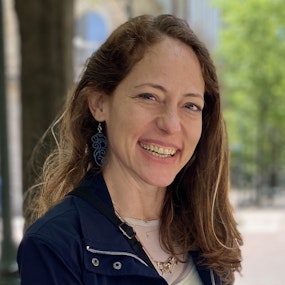
Nora Dunn
The Professional Hobo
Nora Dunn, aka The Professional Hobo, sold everything she owned (including a busy financial planning practice) to travel the world in 2006. She has enjoyed a travel lifestyle ever since, and is considered one of the original Digital Nomads and Lifestyle Travel Bloggers.
Specializing in slow travel, she has lived in and traveled through over 75 countries while working remotely. She combines her expertise as a former Certified Financial Planner with her lifestyle travel experience, to teach people how to travel long-term in a financially sustainable way.
Nora’s travel experiences range from sublime to absurd to downright terrifying. She survived 3 natural disasters and got 3 tropical diseases, was robbed twice, and had 1 near-fatal accident.
On the brighter side, she accidentally started an international NGO, had a kangaroo fall in love with her and follow her around for 6 months, apprenticed with a shaman in Peru for 2 years, rode 25,000kms of trains in 30 days straight from Lisbon to Saigon, and saved over $100k getting free accommodation around the world in 5 different ways.
Now, Nora is paying it forward. She gives people confidence to travel long-term by helping them set everything up in the best possible way for them – from finances to career to logistics and beyond.
She does this with instructional and inspirational content on her website, YouTube channels, personal consulting services, books, speaking, and more.
Nora has been featured in print, on television, radio, podcasts, and online on outlets like Forbes, Condé Na… Read More




























